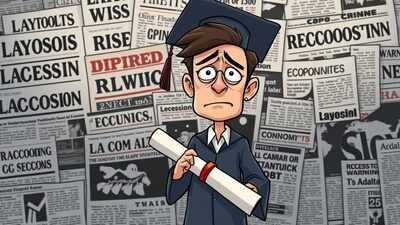ARTICLE AD BOX

The American graduating class of 2026 is stepping into a world where economic downturn meets technological acceleration. A new survey from Handshake, finds that three in five bachelor’s degree seekers are pessimistic about their job prospects, a sentiment that reveals not just anxiety but a crisis of confidence about the future of work.For students who grew up being told that education guarantees stability, the numbers land like a jolt. What does it mean when even tomorrow’s most educated doubt tomorrow itself?
A generation caught in the crossfire
Nearly one in five students said they feel “very pessimistic” about their careers, while an additional 42% said they are “somewhat pessimistic.” Their concerns are familiar: Too few jobs, too much competition, and fragile job security.
But layered on top of this is an unease that belongs squarely to this generation, the uncertainty brought by generative artificial intelligence. About half of respondents said AI is one reason they are not optimistic about their future careers. This aligns with broader survey data from Handshake: a 16% year-over-year decline in job postings and a 26% rise in applications per position. One product design major, quoted by Inside Higher Ed, put it starkly: “The political climate has made me lose a lot of hope for not only the job market, but my future as a whole.
Everything feels very divided and unstable.”
AI in the spotlight
Handshake’s report shows that generative artificial intelligence has become both a tool and a tension point. More than 80% of seniors say they have used such tools, whether ChatGPT, Gemini, or Copilot. One in four students uses them daily, mostly for brainstorming or self-teaching. Half use AI for written communication, while the other half deliberately avoid it. Employers, however, see things differently. More than 80% of hiring managers told Handshake that comfort with AI tools is now somewhat or very important for entry-level hires. A separate survey from Nexford University found that 26% of hiring managers already view AI fluency as a baseline requirement. The divide is telling. When asked whether generative artificial intelligence would create jobs, only 24% of students agreed, compared with more than half of hiring managers. Yet 46% of students also said they were glad AI tools exist, and 40% believe the technology could improve their productivity. The ambivalence reflects both hope and hesitation, as students weigh the benefits of AI against its shadow of displacement.
A shifting skills landscape
Interestingly, Handshake’s data shows that “AI-exposed” careers, the ones most likely to see task reassignment to technology, are not declining faster than others. Instead, postings in fields like tech and marketing are increasingly demanding skills in prompt engineering, chatbot use, and AI-enhanced workflows. Rather than removing opportunity, AI may be redrawing its contours, widening the gap between those fluent in these tools and those still resisting them.
What the numbers reveal
Behind the percentages lies a deeper story about instability. The Class of 2026 is not just worried about jobs; it is wary of what lies beneath, the politics, economics, and technologies reshaping the workforce. Their pessimism, at 62%, is a data point but also a warning sign. It suggests that America’s next wave of talent may enter the workforce already doubting its ability to thrive there.
The bigger question
So, is artificial intelligence turning their future into uncertainty? Not entirely. Handshake’s own analysts suggest that AI is not the only factor influencing the early-career job market. Economic slowdown, declining postings, and political polarization weigh heavily, too. But what AI represents — speed, disruption, and a sense of being unprepared, has made it the face of student anxiety.This generation is the first to graduate into a market where AI skills are not a bonus but a baseline. Whether they see that as a threat or an opportunity will define not just their own futures, but the shape of work itself.



.png)
.png)
.png)
















 6 days ago
10
6 days ago
10







 English (US) ·
English (US) ·